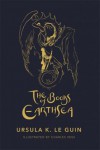100
Followers
65
Following
Arbie's Unoriginally Titled Book Blog
It's a blog! Mainly of book reviews.
Currently reading
Station Zero
Progress:
220/282 pages
The Books of Earthsea: The Complete Illustrated Edition
Progress:
749/997 pages
The Penguin Book of Russian Poetry
The Uncertain Land and Other Poems
Progress:
8/160 pages
The Heptameron (Penguin Classics)
Progress:
152/544 pages
The Poems and Plays of John Masefield
Progress:
78/534 pages
Poems Selected
Progress:
4/50 pages
Selected Poems
Progress:
18/160 pages
The Penguin Book of Scottish Verse
Hainish Novels & Stories, Vol. 2
Progress:
133/789 pages
 I once read a book of reviews of imaginary books. It was undoubtedly a weird idea but was worthwhile so far as I remember it - very philosophical. I think it was by Stanislaw Lem.
I once read a book of reviews of imaginary books. It was undoubtedly a weird idea but was worthwhile so far as I remember it - very philosophical. I think it was by Stanislaw Lem.What I'm about to do seems a lot weirder, though: Review on Goodreads a book of Goodreads reviews (of real books). I should say I was offered a free copy by the author who, according to the foreword thinks I'm "wonderful" despite the fact that our primary mode of interaction is arguing about such nonsense as the Strong Anthropic Principle, Intelligent Design, Mathematical Platonism and the Many Worlds Interpretation of Quantum Mechanics where-in I take a robust scientific position and the author has a bad habit of sloping off to a Solipsist position when he's losing... It should also be noted that the author also takes perverse pleasure in quoting negative and insulting portions of people's reviews of his review collections...
So on to the book, which is divided into themed sections. My favourite was "Life on Goodreads" where-in gentle fun is poked at the foibles of Goodreaders; foibles that I would really like to say I'm not guilty of. I'd be lying if I did, though...
Also on display are many reviews that consist of more or less bizarre and fanciful pastiches of the books they purport to review. These can be entertainingly witty but also tend to be incomprehensible if one has not actually read the book in question. All the "Life on Goodreads" reviews are also pretty much useless for conventional purposes i.e. helping people decide if they want to read the book under review. Some reviews are at best tangentially relevant anecdotes about the author's life. Given the popularity of Rayner on Goodreads, it is therefore abundantly clear that this conventional type of review is not the only kind that Goodreaders appreciate.
Why would anyone (pay to) read this book? Well it used to be that they were all available for free on Goodreads so the only answers would be because either 1) you expect to be web-challenged for a time and need to feed your addiction or 2) you are blatantly stupid. The author has, however, now truncated these reviews on the website thus forcing those nutty enough to buy a copy of the book. I think this is known as "Marketing."
Rayner, when he offered me a copy, expressed interest in my views on the "Science" section, which focuses on cosmology/astronomy/fundamental physics and the relationship between science and religion, and suggested I might perceive a pattern. Well I noted two things, neither of which are what I was supposed to, I expect. The first is that Rayner clearly knew more at the end of the section than at the beginning, the reviews being set in chronological order of reading by the reviewer. The second is much more important (and something I had already concluded): Pop science books are almost all rubbish. Expanding on this, I believe the following:
Many of the better ones are in fact history books and don't try to tackle cutting edge science. Most of the best pop science books are written by genuine scientists but this is no guarantee of quality. The average standard of pop science book has deteriorated over time. Most contemporary pop science books show an alarming lack of impartiality, self criticality or even distinction between what is hypothesis and what is theory and what is controvercial and what is not. Many of the authors of them couldn't explain clearly the sum of 1 and 1, let alone cutting edge scientific concepts.
Now, given that I say that Rayner knew more at the end than the beginning how can I be claiming all this? Well, because he has read widely not just one book and has read critically, i.e. noting contradictions, logical flaws, weight of evidence presented and so forth. This is the only way to do it and applies just as much to actual scientists in professional life as to anyone else.
A phenomenon well known to psychologists is that people tend to believe the first thing they hear about a topic, so if you read Dawkins' Selfish Gene you are very likely to believe Dawkins when some-one presents counter arguments. On the other hand if you'd read Eldredge's Re-inventing Darwin you'd be more likely to believe the Gould-Eldredge camp. This is a difficult problem to overcome, as can be seen easily on Goodreads where numerous ill-informed people who've read (only) one book on a subject take it as some kind of Divine Revelation that is Obviously and In-arguably True. How to overcome this problem? Never buy pop science books one at a time; always take the time to find two books with contrasting views and read them back-to-back. That'll help but don't stop there; read widely on the subject, as Rayner has. Make a conscious effort to keep an open mind and find the flaws on both sides of the argument. Put the effort in - it's unavoidable if you want to be respected by others when discussing the subject - whatever it might be - because the above doesn't just apply to one area of science publishing - it applies to every area I've read myself.
Here are two examples of pop science done well; neither is an easy read and one of them is extremely tough going but both show how it should be done, bending over backwards to be fair to opposing views and pointing out all the flaws in their own theories:
[b:The Origin of Species|22463|The Origin of Species|Charles Darwin|http://d202m5krfqbpi5.cloudfront.net/books/1298417570s/22463.jpg|481941]
[b:The Road to Reality: A Complete Guide to the Laws of the Universe|10638|The Road to Reality A Complete Guide to the Laws of the Universe|Roger Penrose|http://d202m5krfqbpi5.cloudfront.net/books/1320528862s/10638.jpg|1077395]










